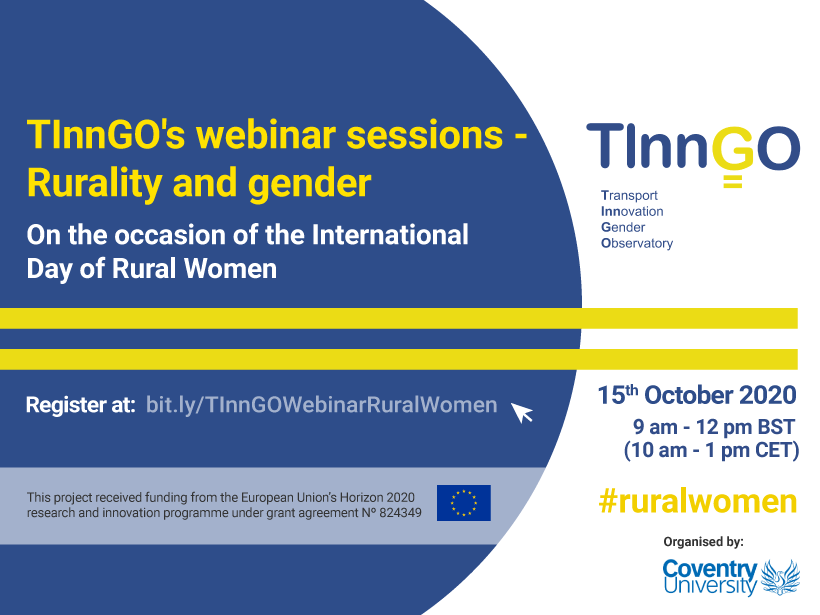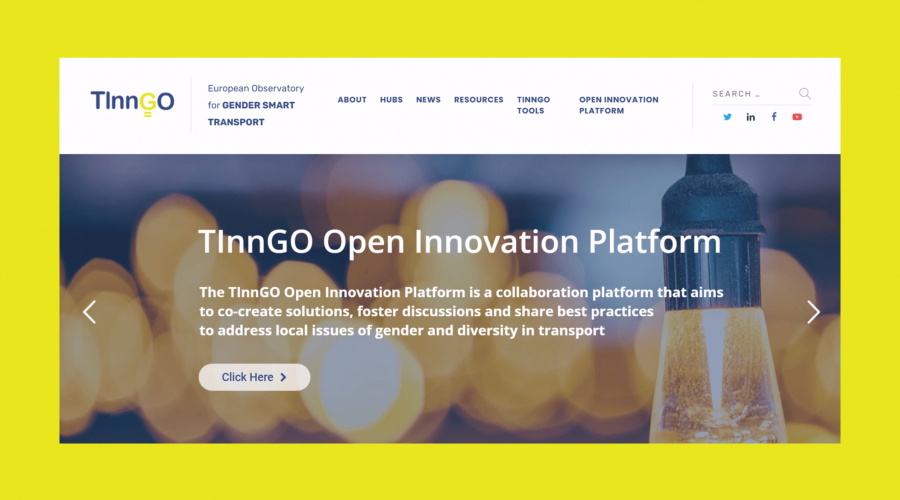On 15th October 2020, the TInnGO project hosted a webinar on gender and rurality, celebrating International Day of Rural Women with special guests presenting their works and studies on different rural areas in the United Kingdom and Serbia. The panel of speakers was composed of Biljana Ranković, Polly Gibb, Julia Lyford, Jacquie Bridgman, and Hannah Budge.
Rural women and diversity are being investigated by TInnGO and the UK hub. To continue stimulating the discussion and calling attention to their issues, the recorded sessions and presentations are available on our YouTube page.
The first presenter was Dr. Biljana Ranković, with an overview of the European Union’s rurality scenario and how opportunities for rural women are influenced by factors such as transport, household configuration, and more. Click to access her video and presentation in PDF.
Biljana is a Research Assistant Professor at the University of Belgrade, who has conducted extensive research and published her work around various themes, including rurality, transport, and gender. Her many papers explore issues of mobility and transport for the elderly rural population, public transport provision in rural areas, mobility deprivation in low-income rural households, women’s transportation demands in rural Serbia, and more.
The second presenter was Polly Gibb, who has a Biology degree from Oxford University and an MSc in Land Resource Management from Cranfield. After graduating, she spent several years in less developed countries working in agricultural and rural development, latterly in enabling rural women to generate cash through entrepreneurial activity. Since returning to England, Polly worked for environmental charities and ran her own rural business, prior to the inception of WiRE (Women in Rural Enterprise). Polly was part of the WiRE team which won the Queen’s Anniversary Prize for contribution to enterprise in 2005 and became director of WiRE in 2009.
Polly Gibb presented WiRE’s work on supporting entrepreneurial women in rural and countryside areas, showcasing successful stories, barriers, and the experience gained in past and present projects. As a former entrepreneurial woman herself, Polly provided great insight on how diverse rural economy and gender can be, as well as discussing possible tools and strategies to incentivise rural business and diversity. Access her video and presentation in PDF.
Julia Lyford has worked in the community for over 35 years, as a youth worker with a stint at the National Youth Agency, management adviser with Derby CVS, regional posts with YWCA and Age UK, regional adviser to the NE Equality and Diversity Forum from 2001-5, and funding and project developer with various local community-based projects. Julia has been a member of the NE Rural Affairs Forum, and the NE Equalities Coalition, and is active in the Local Action Group for Leader Rural European funds.
Julia Lyford presented her instigating work in Northampton with rural immigrant and local women, the challenges of transport, cultural adjustment, access, and maintenance of work placement. Through innovative and instigating approaches, Julia and her colleagues presented the various opportunities to make rural women’s voices heard and presented to policymakers and the general society, in the form of autobiographical videos, artwork, and more. Access her video and presentation in PDF.
Jacquie Bridgman is engaged as a Research Assistant at Societal and the University of Northampton. She has previous experience working in Highways & Transportation for the Local Authority and in the voluntary advice sector. Jacquie has provided research expertise in European Commission projects and subject matter expertise in the Horizon 2020 programme. Her research interests include Transport Poverty, Social Exclusion, Women’s Mobility, and Gender Studies. Jacquie is also presently studying for her PhD, researching the mobility patterns of lone mothers.
Jacquie Bridgman presented an overview of Northampton’s transport and mobility patterns between rural and urban areas, both for workers and familial commuting. Issues of transport access and availability, as well as the elderly population’s needs, were covered in her presentation, pointing out how the current system is car-dependent and excludes minorities with no access to private transportation, be it economically or due to disabilities and many other issues. Access her video.
Hannah Budge is an ESRC funded PhD researcher at the Centre of Rural Economy, Newcastle University, UK. Her thesis will examine the role of women in agriculture in the Scottish Islands, looking at the barriers in this industry experienced between and within these communities. She is interested in how gender impacts everyday life in rural areas.
Hannah Budge provided us with a novel insight on her research and a little bit about her personal life as both a researcher and a woman from the rural Scottish Islands. She shared the challenges of getting access and instigating the debate around agricultural women, gender, and culture, before and after the pandemic. Access her video.





